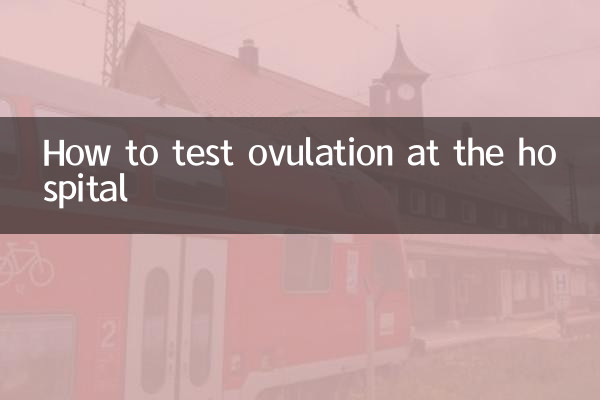How to test ovulation at the hospital
With the improvement of health awareness, more and more women are beginning to pay attention to their ovulation cycle, whether to prepare for pregnancy or to understand their physical condition. Going to the hospital to measure ovulation is a scientific and accurate method. This article will introduce the relevant procedures and precautions in detail to help everyone better understand this process.
1. Why go to the hospital to test ovulation?

Testing ovulation not only helps prepare for pregnancy, but also helps women understand their reproductive health. Hospital testing methods are more precise and usually include ultrasound monitoring and hormone level testing, which can accurately determine the time of ovulation.
2. Commonly used methods for ovulation testing in hospitals
The following are the ovulation testing methods commonly used in hospitals and their characteristics:
| method | describe | advantage | shortcoming |
|---|---|---|---|
| Ultrasound monitoring | Observe the development of follicles through vaginal B-ultrasound | Intuitive and accurate | Requires multiple trips to the hospital |
| Hormone testing | Blood tests for LH, estrogen and other hormone levels | Data, science | Blood drawing is required and the cost is higher |
| cervical mucus test | Observe changes in cervical mucus properties | Non-invasive and simple | Highly subjective and less accurate |
3. The specific process of measuring ovulation
1.Appointment registration: Choose gynecology or reproductive medicine and make an appointment with a doctor in advance.
2.initial consultation: The doctor will ask about menstrual cycle, medical history and other information to make a preliminary judgment on the testing plan.
3.Ultrasound monitoring: Usually starts on the 10th day of menstruation and is performed every 2-3 days until ovulation.
4.Hormone testing: Depending on the ultrasound results, hormone testing may be required.
5.Result analysis: The doctor will judge the ovulation time based on the data and give suggestions.
4. Precautions
1.Time selection: It is recommended to test during specific times of the menstrual cycle.
2.cost: The fees may vary in different hospitals and regions. The following are reference prices for some hospitals:
| hospital type | Ultrasound monitoring single cost | Hormone testing single cost |
|---|---|---|
| tertiary hospital | 150-300 yuan | 200-500 yuan |
| private hospital | 300-600 yuan | 400-800 yuan |
3.Mental preparation: The testing process may require multiple trips to the hospital, so be patient.
4.Diet and rest: Avoid strenuous exercise and maintain a normal diet and rest before the test.
5. Frequently Asked Questions
Q: Is fasting required to test ovulation?
A: Ultrasound monitoring does not require fasting, but hormone testing may require fasting blood drawing, which is subject to the doctor's requirements.
Q: When is the best time to test ovulation?
A: It is generally recommended to start on the 10th day of the menstrual cycle. The specific time varies from person to person.
Q: Is ovulation testing helpful for pregnancy preparation?
A: Yes, accurately grasping the time of ovulation can greatly increase the chance of pregnancy.
6. Summary
Going to the hospital to measure ovulation is a scientific and effective method that can help women better understand their physical condition. Through the combination of ultrasound monitoring and hormone detection, ovulation time can be accurately determined, providing strong support for pregnancy preparation or health management. It is recommended to choose a regular hospital and follow the doctor's instructions to obtain the best results.

check the details

check the details